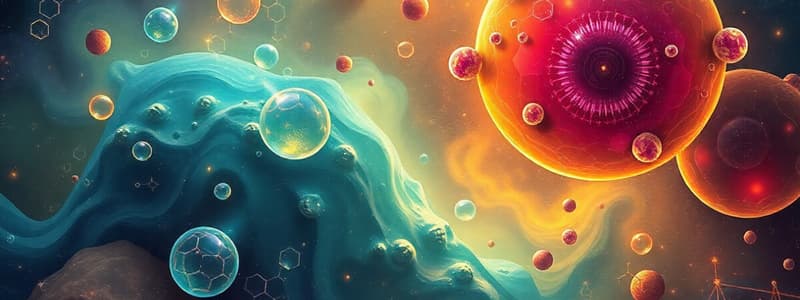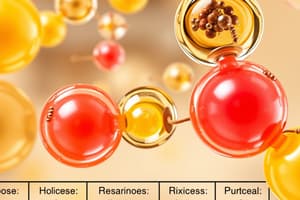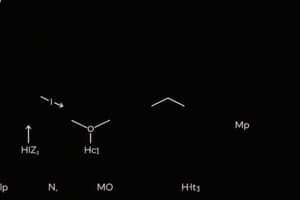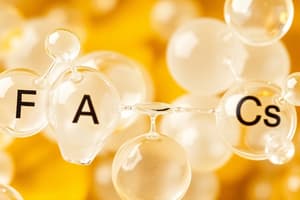Podcast
Questions and Answers
What type of fatty acid solely contains carbon-carbon single bonds?
What type of fatty acid solely contains carbon-carbon single bonds?
- Polyunsaturated fatty acid
- Monounsaturated fatty acid
- Essential fatty acid
- Saturated fatty acid (correct)
Which of the following is an example of a polyunsaturated fatty acid?
Which of the following is an example of a polyunsaturated fatty acid?
- Stearic acid
- Alpha-linolenic acid (correct)
- Oleic acid
- Palmitic acid
What is a function of essential fatty acids (EFAs)?
What is a function of essential fatty acids (EFAs)?
- They prevent the synthesis of eicosanoids.
- They are required for membrane structure and function. (correct)
- They function exclusively as energy sources.
- They enhance fatty liver formation.
Which fatty acid is considered an omega-3 fatty acid?
Which fatty acid is considered an omega-3 fatty acid?
What primarily causes oxidative rancidity in fats and oils?
What primarily causes oxidative rancidity in fats and oils?
Which essential fatty acid is abundant in soy oil and sunflower seeds?
Which essential fatty acid is abundant in soy oil and sunflower seeds?
What is the term for the deterioration of fats and oils that results in an unpleasant taste?
What is the term for the deterioration of fats and oils that results in an unpleasant taste?
Which type of fatty acid is primarily susceptible to rancidity?
Which type of fatty acid is primarily susceptible to rancidity?
What role do phospholipids play in cholesterol management?
What role do phospholipids play in cholesterol management?
What are glycolipids composed of?
What are glycolipids composed of?
What is a primary function of ceramides?
What is a primary function of ceramides?
Which type of lipoproteins is characterized by a high density?
Which type of lipoproteins is characterized by a high density?
Which type of fatty acids primarily occur in dairy products?
Which type of fatty acids primarily occur in dairy products?
What is a common characteristic of saturated fatty acids?
What is a common characteristic of saturated fatty acids?
What is the main function of lipoproteins in the body?
What is the main function of lipoproteins in the body?
Cephalins, a type of phospholipid, are primarily involved in which process?
Cephalins, a type of phospholipid, are primarily involved in which process?
What type of alcohol forms neutral fats or oils?
What type of alcohol forms neutral fats or oils?
Which group of lipids is classified as having additional prosthetic groups?
Which group of lipids is classified as having additional prosthetic groups?
Which of the following is an example of a wax?
Which of the following is an example of a wax?
What is a primary function of phospholipids?
What is a primary function of phospholipids?
Which phospholipid type contains glycerol as its alcohol?
Which phospholipid type contains glycerol as its alcohol?
What is one of the consequences of phospholipid accumulation in the liver?
What is one of the consequences of phospholipid accumulation in the liver?
Which fatty acid is released from phospholipids and serves as a precursor for eicosanoids?
Which fatty acid is released from phospholipids and serves as a precursor for eicosanoids?
What distinguishes sphingophospholipids from glycerophospholipids?
What distinguishes sphingophospholipids from glycerophospholipids?
What does the acid number measure in fats and oils?
What does the acid number measure in fats and oils?
Which fat is expected to have the highest saponification number?
Which fat is expected to have the highest saponification number?
What does a high iodine number indicate about an oil?
What does a high iodine number indicate about an oil?
What type of fatty acids are primarily tested using the Reichert-Meissl number?
What type of fatty acids are primarily tested using the Reichert-Meissl number?
What is produced as a result of the saponification process?
What is produced as a result of the saponification process?
How can you determine the purity of butter?
How can you determine the purity of butter?
What happens during acid hydrolysis of fats?
What happens during acid hydrolysis of fats?
What does an increased acid number indicate about an oil's safety?
What does an increased acid number indicate about an oil's safety?
Flashcards are hidden until you start studying
Study Notes
Lipids Definition
- Organic substances insoluble in water
- Soluble in organic solvents
- Chloroform
- Ether
- Benzene
Lipid Classification
- Simple Lipids - esters of fatty acids with various alcohols
- Neutral fats or oils - esters of fatty acids with glycerol
- Uncharged
- Waxes - esters of fatty acids with higher molecular weight monohydric alcohols
- Examples: Lanolin, Beeswax, Whale sperm oil
- Neutral fats or oils - esters of fatty acids with glycerol
- Complex Lipids - esters of fatty acids with alcohol containing [prosthetic] groups
- Phospholipids - FA + ALCOHOL + PHOSPHORIC ACID
- Frequently contain nitrogen bases
- Glycolipids - FA + ALCOHOL[SPINGOSINE] + CARBOHYDRATE WITH NITROGEN BASE
- Do not contain phosphate group
- Examples: Cerebrosides, Gangliosides
- Lipoproteins - Lipid with prosthetic group PROTEIN
- Examples: Chylomicrons, Very low density lipoprotein (VLDL), Low density lipoprotein (LDL), High density lipoprotein (HDL)
- Phospholipids - FA + ALCOHOL + PHOSPHORIC ACID
- Derived Lipids - Derivatives obtained on hydrolysis of group 1 and group 2 lipids
- Examples:
- Fatty acids
- Steroids
- Cholesterol
- Vitamin A and D
- Examples:
Lipid Functions
- Storage form of energy
- Structural component of cell membrane
- Precursor of many steroid hormones, vitamin D
- Act as thermal insulator
- Protection of internal organs
- Helps in absorption of fat
- Lipoprotein transport
- Surfactants - by reducing surface tension
- Improve taste and palatability
- Electric insulators in neurons
Fatty Acids Definition
- Naturally occurring carboxylic acids
- Unbranched carbon chain
- Even number of carbon atoms
- Long-chain fatty acids (12 to 26 carbon atoms) are found in meats and fish
- Medium-chain fatty acids (6 to 10 carbon atoms) and short-chain fatty acids (fewer than 6 carbon atoms) occur primarily in dairy products
- Saturated fatty acid - Fatty acid chains that contain only carbon-carbon single bonds
- Example: Palmitic acid
- Unsaturated fatty acid - Molecules that contain one or more double bonds
- Example: Oleic acid
- Mono- and polyunsaturated fatty acids
Prostaglandins
- Derivatives of fatty polyunsaturated acids
Essential Fatty Acids (EFAs)
- Two essential fatty acids
- -linolenic acid (LNA or ALA)
- An omega - 3 fatty acid
- Linoleic acid (LA)
- An omega-6 fatty acid found abundantly in soy oil, sunflower seeds, pumpkin seeds, sesame seeds, corn oil, and in most nuts.
- -linolenic acid (LNA or ALA)
EFA Functions
- Membrane structure and function
- Transport of cholesterol
- Formation of lipoproteins
- Prevention of fatty liver
- Synthesis of eicosanoids
Rancidity
- Deterioration of fats and oils resulting in an unpleasant taste
- Fats containing unsaturated fatty acids are more susceptible to rancidity
- Occurs when fats and oils are exposed to air, moisture, light, bacteria etc.
- Hydrolytic rancidity - Partial hydrolysis of triacylglycerols by bacterial enzymes
- Oxidative rancidity - Oxidation of unsaturated fatty acids
Tests to Check Purity of Fats and Oils
- Acid number - Number of milligrams of potassium hydroxide required to completely neutralize the free fatty acids present in 1 g of the oil or fat
- Refined oils should be free from any free fatty acids.
- Saponification number - mg (number) of KOH required to hydrolyze (saponify) one gram of fat or oil.
- Measures the average molecular size of the fatty acids present
- Value is higher for fats containing short chain fatty acids
- Iodine number - Grams (number) of iodine absorbed by 100 g of fat or oil.
- Useful to know the relative unsaturation of fats, and is directly proportional to the content of unsaturated fatty acids.
- Reichert-Meissl (RM) number - Number of ml 0.1 N KOH required to completely neutralize the soluble volatile fatty acids distilled from 5 g fat.
- Useful in testing the purity of butter since it contains a good concentration of volatile fatty acids
- Butter has a RM number in the range 25-30, while it is less than 1 for most other edible oils.
Fatty Acid Chemical Reactions
- Esterification - Reacts fatty acids with alcohols to form esters and water
- Acid Hydrolysis - Reverses esterification to produce fatty acids from esters
- Saponification - Base-catalyzed hydrolysis of an ester
- Products:
- An alcohol
- An ionized salt which is a soap
- Soaps have a long uncharged hydrocarbon tail
- Also have a negatively charged carboxylate group at end
- Form micelles that dissolve oil and dirt particles
- Products:
Studying That Suits You
Use AI to generate personalized quizzes and flashcards to suit your learning preferences.




